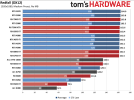DegustatoR
Legend
Redfall seem to be another heavily CPU limited UE4 title:

 www.tomshardware.com
www.tomshardware.com
The difference is that the limitation happens at >120 fps so it's less of an issue for the majority of players.
The game also support DLSS3 helping to hit even higher fps in CPU limited areas.

Redfall GPU Benchmarks: AMD, Intel and Nvidia Cards Tested
Unreal Engine meets vampires, DLSS 3, and open world gameplay
The difference is that the limitation happens at >120 fps so it's less of an issue for the majority of players.
The game also support DLSS3 helping to hit even higher fps in CPU limited areas.

